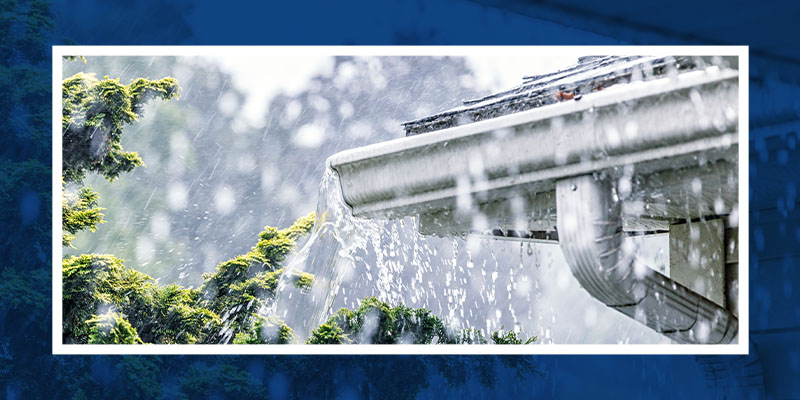
Your home’s gutters collect rainfall from the roof and direct it away from the foundation. They prevent water from pooling around your property, which would otherwise cause erosion, flooding and structural damage. These aspects of your exterior are vital in maintaining the integrity and longevity of a home’s various components.
Because gutters are outdoors, they can be vulnerable to changing weather conditions like hail, snow, wind and the sun. The elements can affect your home’s life span, but you can keep it in peak condition longer with timely gutter maintenance.
Hail
Hail can dent and puncture your gutters. Intense hail knocking against your gutters may cause them to become uneven and misshapen. Water flows irregularly through storm-damaged gutters, compromising the drainage process.
Quarter-sized hailstones driven by wind could create holes that prevent adequate water drainage. Unaddressed, these holes may grow more prominent when the snow sets in and can cause rainwater to fall close to your house’s foundation.
After a hailstorm, inspect your home’s exterior to identify hail damage and get it repaired before the problem escalates.
Snow and Ice
Snow and ice may result in breakage, flooding and damage. Ice pooled inside your gutters can freeze, blocking the channels. When the rain sets in again, water that cannot flow to the downspout will overflow. As the temperatures freeze and thaw, some of the attachments in your gutter can separate and cause water leakage.
Heavy snow lying dormant for days can lead to sagging gutters, which may damage them and cause the fascia boards to come undone. If the snow is weighty, it can break your drain pipe, flooding your yard. In severe cases, the extra weight of snowfall and ice can cause damage and injury.
Wind
The wind can cause leaves and other debris to block your gutters, which results in rain being unable to flow out of them. If your gutter sits at an angle that catches powerful gusts of wind for most of the season, it can become susceptible to metal fatigue — a condition where the screws and nails holding your gutters in place can become worn and weak. In more severe cases, your gutters could rip away from your house. Gutters blowing off is a particular risk where gutter maintenance and cleaning are lacking.
Heat and the Sun
The sun’s rays can cause your gutters to become rigid, baking the inside connections and weakening their joints. Scorching temperatures and UV exposure may cause thermal shock. The shock can cause gutter damage like cracks, tears and breakage.
Most gutters are aluminum, which is susceptible to thermal expansion. Prolonged periods of heat and sun can crack and bend connections in your gutters.
Warmer weather can also attract birds and squirrels, who may nest in your gutters. The added weight can stress the gutters’ structure, causing damage over the long term.
Rain and Its Effects
Heavy rain tends to lift debris like leaves and dirt, causing these materials to travel with the rainwater. The added debris clogs your gutters, resulting in blockages and overflow.
Severe rain and thunderstorms may bend or loosen your gutters away from the fascia boards. The rain collecting in your gutters could be too heavy. Check your fascia boards’ condition and installation. Use suitable weight-bearing materials that hold your gutters in place and prevent them from loosening.
Damaged Gutters Can Cause Problems for Your Home’s Foundation
Gutters and downspouts guide water safely away, preventing staining, rot, and deterioration of siding, exterior walls and paint.
Gutters protect your home from rain, snow and hail by acting as a horizontal barrier. They direct water away from your house and into designated drainage points called downspouts. If your gutters are in poor condition, they expose your home’s structure to the elements, and the effects will become evident. Damaged gutters can cause the following problems for your home.
- Trapped ice: Ice can soak into and dampen your roof and exterior walls, causing structural damage. Unsightly blistering on your home’s paint is another concern.
- Ruined landscapes: When your gutters cannot correctly divert rainwater, the water will flow into your yard, ruining your landscaping. Excessive water can choke plants, leading to costly damage.
- Flooded basement: If water spills into the foundation of your house, it can seep into your basement, causing flooding. A flooded basement can result in electrical damage, mold, mildew buildup and pest infestation.
- Cracked driveway: Your property’s driveway can show signs of water damage due to water spilling from your gutters. Cracks in your driveway can cause shifting, another expense you may have to deal with.
- Rotten wood: Water overflow can rot the fascia boards and wood around your home, leading to structural issues.
- Insects: You may see more insects than usual in your home due to damaged or broken gutters. Decaying leaves and rotten wood make the perfect breeding ground for pest infestation.
- Foundation damage: If your gutters cannot adequately move water through the pipes down the downspouts, the water may fall close to the foundation of your house.
- Erosion: Rainwater spilling from clogged gutters can create channels in the soil around your home. Erosion removes nutrient-rich topsoil, preventing your yard or garden from thriving. Soil erosion also contributes to flooding, especially during heavy rainfall.
Trust A Better Gutter Cleaning for Gutter Installation in Atlanta

Gutter repair in Atlanta is crucial because this part of your home is vulnerable to year-round damage. Your home might be at risk if your gutters are not in optimal condition, especially if your foundation becomes damaged or weakened as a result.
At A Better Gutter Cleaning, we have been cleaning, repairing and maintaining gutters in Atlanta since 1998. Whether you need a complete gutter overhaul or a routine inspection, our team of dedicated professionals will ensure a seamless and transparent process from start to finish. Feel free to get an online estimate or contact us through our online form today!












